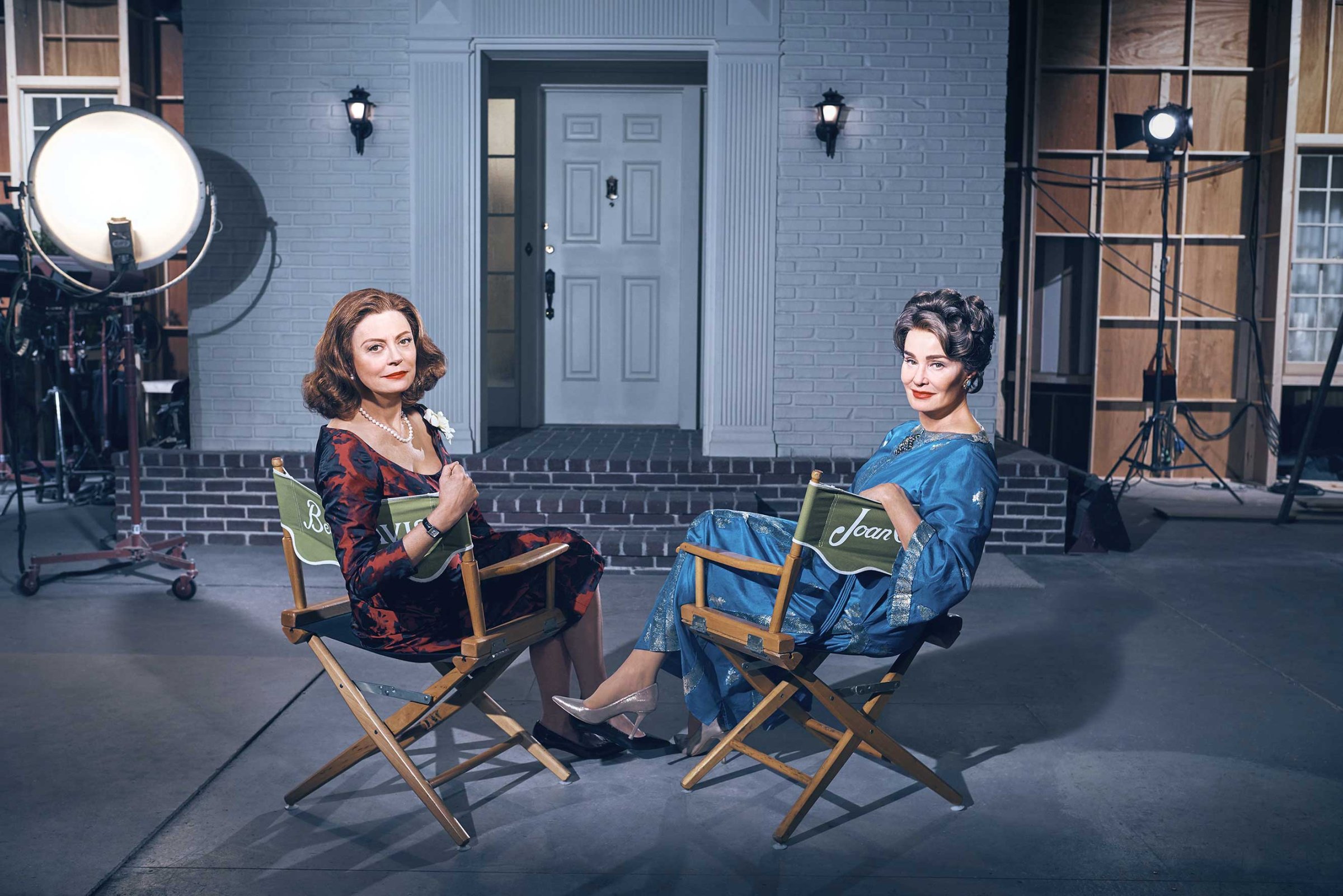
Some things do get better with age.
Feud: Bette and Joan, FX’s limited series about the animosity between titular Oscar-winners Davis (Susan Sarandon) and Crawford (Jessica Lange) in 1960s Hollywood, impressed me in its early going. But, ultimately, the show fell short of transcendence. There was plenty to like, from the carefully executed sets and costumes to the shrewd perspective on Davis as the ultimate survivor to Lange’s woozy Crawford, on the verge of losing what was most important to her: control. But the show’s device of a documentary crew talking to bystanders about the grande dame contretemps yielded a lot of very thudding exposition but little of the insight so evident elsewhere in the show. It may have been employed intermittently, but each time it became more irritating. We were first shown, artfully and in self-consciously grand terms, how the movie industry had mistreated Davis and (most especially) Crawford, and then we were told it.
Still, Feud‘s final episode, which aired Apr. 23, cemented what was already one of the year’s biggest achievements as one of the best, too. Partly, it was the episode’s early focus on Crawford. I’d been spurious as to how Feud would keep going once Davis and Crawford left one another’s lives. But that was before it became clear that Bette and Joan was really a story in which Joan came first. As played by Lange, she was at once provocateur and victim, a master game-player who had lost any sense of fun. With movies largely behind her, Crawford played the lead in her own private drama.
For all her vanities and all her ability to get sucked into the feud, Sarandon’s Davis could never be this show’s engine. She, after all, was Hollywood’s golden child but hardly emblematic—the cerebral actor’s actor for whom glamour was important but not essential. She’s interesting, but there’s only so much to learn from a sui generis case. (Though the degree to which even that seemingly less constricting image was a bind is still fascinating. After moving on from Crawford, Davis tries to pick a feud with the above-it-all Katharine Hepburn. And she can’t help herself from delivering a cruel one-liner after Crawford’s death, regretting it even as she says it.)
Crawford, more broken by the system, has more to show. And boy, does she. Early un the finale, Crawford’s vanity seems less crushed by the humiliations she’s suffered than pressed like a flower between the pages of a book—changed by stress into something odd though somewhat like itself. To see her explain “the buckle,” her tooth-removal surgery meant to create the appearance of strong cheekbones that is now causing bone loss, is haunting. Crawford knows young people would never understand, and knows, somewhere inside, that she’s done damage to herself. But she would never admit it. It’s easier, finally, to give up. The series of events, including the filming of sci-fi disaster Trog and health setbacks, that culminate in her withdrawing into her apartment forever are both beautifully (and, no surprise, wittily) rendered. This all takes on the tones of Hollywood melodrama. Crawford, who so deeply identified with the image she’d crafted character by character, was a self-styled survivor. The show’s creators know it’d take a lot to make her quit.
Feud made its points loudly and boldly, but I found myself vibing with it more and more as I tapped into its particular tone. Maybe it’s easier to connect with a show that does its best work at an operatic volume once you’ve grown more sympathetic to a subject who’s the same. Or maybe I was waiting for something—a camp extravaganza, a subversive and draggy soap—that Feud, patient and earnest, never tried to be. The documentary aspect works in the finale, bringing together as it does characters from across the series to eulogize Joan. It’s subtle as a sledgehammer, and so is a scene in which a young (evidently) gay man shows up at Crawford’s book signing to tell her she’s a survivor. There’s a surrender needed for Feud to work on you that’s not required from most contemporary entertainment.
This makes it an unusual project, of sorts, for Ryan Murphy, whose work more often suggests a harsh critic of society than a fan. But movie love and deep humanity make Feud something special and odd. There’s plenty Feud has to say, but precious little edge. Like Big Little Lies, its contemporary and its likely Emmy competitor, it dreams a world in which women cooperate. But it also depicts, in frank, unadorned, and empathetic ways the toll that’s exerted when they cannot.
More Must-Reads from TIME
- Donald Trump Is TIME's 2024 Person of the Year
- Why We Chose Trump as Person of the Year
- Is Intermittent Fasting Good or Bad for You?
- The 100 Must-Read Books of 2024
- The 20 Best Christmas TV Episodes
- Column: If Optimism Feels Ridiculous Now, Try Hope
- The Future of Climate Action Is Trade Policy
- Merle Bombardieri Is Helping People Make the Baby Decision
Contact us at letters@time.com